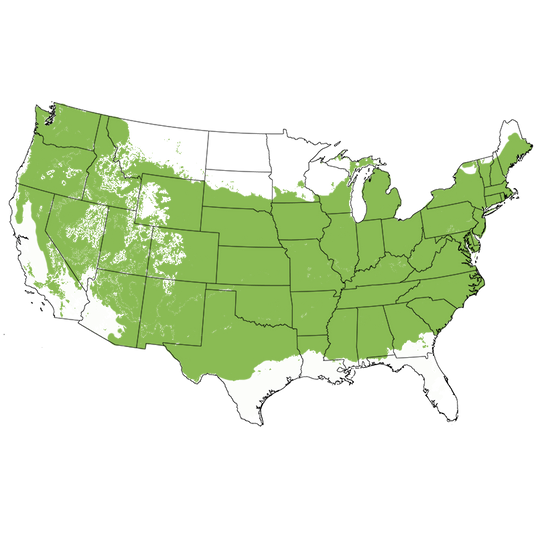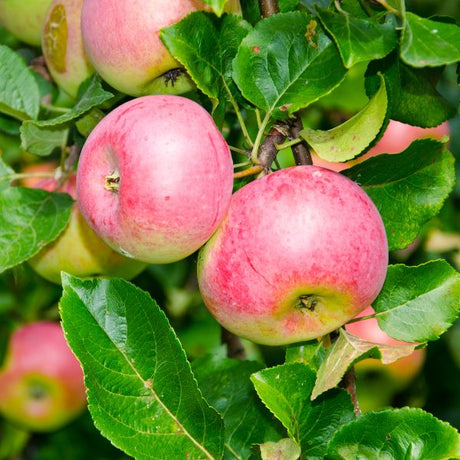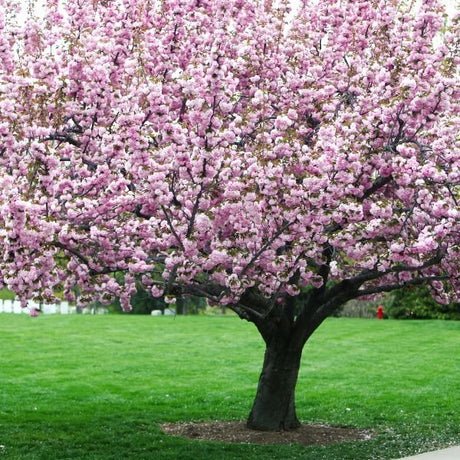USDA Organic Enterprise Apple
- Stay Protected with Plant Sentry ™
USDA Organic Enterprise Apple - B&B (Balled & Burlapped) 10-12 Feet is backordered and will ship as soon as it is back in stock.
To receive an email notification when our next crop is ready, please enter your email below..*
Plant Sentry™
Plant Sentry™
Plant Sentry is designed to protect both consumers and the nursery trade from invasive plant pests and diseases. Sites that display the Plant Sentry protection badge are protected from consumers buying and nurseries shipping material carrying invasive pests and diseases.
This proprietary eCommerce software prevents the shipment of a restricted plant to each state. The Plant Sentry system includes a shipment certification program. The Plant Sentry Compliance Officer works closely with NatureHills.com and each nursery or fulfillment center to ensure only compliant plants are sold to customers.
Click Here to learn more

Delivery and Shipping
Delivery and Shipping
Shipping
To obtain a more accurate shipment time-frame, simply enter your zip code in the “Find Your Growing Zone” box to the right. Our plants are grown all over the country and lead time on items may be different because of this. Once your order is placed, you will also receive the specific shipment time-frame information as part of your order confirmation. Once an item ships, you will receive shipment notification and tracking numbers, so you can follow along while your plant travels to your doorstep. We use FedEx, UPS, or USPS at our discretion.
Due to winter weather we have put a hold on shipping to the areas shown below in grey. You can still order now and we will ship the plant to you during an appropriate time for your zone.
Standard Shipping Rates
At Nature Hills we handle, package and ship the products you order with the utmost care to ensure healthy delivery. Shipping and handling charges are calculated based on the tables below. Please note that some items include an additional handling surcharge, these will be noted on the item's product page.
| From | To | S&H |
|---|---|---|
| $0 | $19.99 | $24.99 |
| $20 | $49.99 | $29.99 |
| $50 | $69.99 | $34.99 |
| $70 | $99.99 | $39.99 |
| $100 | $129.99 | $44.99 |
| $130 | $149.99 | $48.99 |
| $150 | $150+ | Approx 28% |
Click here to see our full rates
Buying Options for Plants
Nature Hills sells a large variety of plants with several options available. Plants are offered in both potted containers and as dormant bare root without soil. Here is a helpful resource to understand your options as you create a beautiful landscape with help from Nature Hills.
Ever wonder what a larger plant will mean for your landscape? Container Sizes are really all about the age of the plant!
Seasonally, Nature Hills offers hand selected, high quality bare root trees, shrubs and perennials. Bare root plants are sold by height from the top of the root system to the top of the plant. Plants may be taller than the height minimums.
- Popular sizes of select trees are 1 foot, 2 feet, 3 feet, etc.
- Popular sizes of select bare root plants is 1 foot, 18 inches, etc.
Nature Hills Container Size by Volume
Keep in mind, specific varieties and different growing conditions can affect the rate at which plants grow. Variations in size may occur.
| Young Plants to 18 Months | ||
|---|---|---|
| Size | Volume | |
| 2"x2"x3" | Ranges from | .18 to .21 dry quarts / .198 to .23 dry liters in volume |
| 4.5" Container | Equal to | .65 dry quart / .72 dry liter in volume |
| Sprinter Pot | Equal to | .63 dry quart / .69 dry liter in volume |
| 4" Container | Ranges from | .31 to .87 / .35 to .96 dry liter in volume |
| 6" Container | Equal to | 1.4 dry quarts / 1.59 dry liters in volume |
| 1 Quart | Equal to | 1 dry quart / 1.1 dry liter in volume |
| 5.5" Container | Equal to | 1.89 of a dry quart / 2.08 dry liters in volume |
| 4"x4"x5" | Ranges from | .8 to 1.1 dry quarts / .88 to 1.2 dry liters in volume |
| 4"x4"x6" | Ranges from | 1.0 to 1.3 dry quarts / 1.1 to 1.41 dry liters in volume |
| 4"x4"x9" | Ranges from | 1.1 to 2.1 dry quarts / 1.2 to 2.3 dry liters in volume |
| 4"x4"x10" | Ranges from | 1.7 to 2.3 dry quart / 1.87 to 2.53 dry liters in volume |
| Plants 18 Months - 2.5 Years Old | ||
|---|---|---|
| Size | Volume | |
| 2 Quart | Equal to | 2 dry quarts / 2.2 dry liters in volume |
| #1 Container | Ranges from | 2.26 to 3.73 dry quarts / 2.49 to 4.11 dry liters in volume |
| 5"x5"x12" | Equal to | 3.5 to 4.3 dry quarts / 3.85 to 4.74 dry liters in volume |
| Plants 2 - 4 Years Old | ||
|---|---|---|
| Size | Volume | |
| #2 Container | Ranges from | 1.19 to 1.76 dry gallons / 5.24 to 7.75 dry liters in volume |
| #3 Container | Ranges from | 2.32 to 2.76 dry gallons / 10.22 to 12.16 dry liters in volume |
| Plants 3 - 5 Years Old | ||
|---|---|---|
| Size | Volume | |
| #5 Container | Ranges from | 2.92 to 4.62 dry gallons / 12.86 to 20.35 dry liters in volume |
| #6 Container | Ranges from | 5.25 to 6.01 dry gallons / 23.12 to 26.42 dry liters in volume |
| #7 Container | Ranges from | 5.98 to 6.08 dry gallons / 26.34 to 26.78 dry liters in volume |
Plant Highlights
USDA Organic Enterprise Apple highlights at a glance!
Plant Highlights
Plant Highlights
-
Brand
-
Botanical Name
-
Growing Zones
-
Mature Height
-
Mature Spread
-
Sun ExposureFull Sun
-
Moisture
-
Soil
-
Growth RateMedium
-
Fall Color
-
Pollinator Friendly
-
Pollinator Required
-
Fragrant
-
Pruning Time
-
Bloom PeriodEarly Spring, Late Spring
-
Harvest Time

Growing Zones 5-8
Beginner Friendly USDA Organic Enterprise Apple!
- A Great Beginner Apple Tree!
- Crimson-Red Skin with a Mild Yellow Flesh
- Crispy Sweet & Sharply Tart Flavor
- White Crisp Flesh
- Pink & White Fragrant Blossoms
- Resistant to most Apple Disease
- Strong & Cold Hardy
- Late Season Producer
- Harvest in October - November
- Regular Good Yields
- Great For Baking, Cooking or Fresh Eating
- Long Storage Flavor
- ~400 Chill Hours
Have you ever wanted to grow your own apples but thought it would be too difficult? Well, it is time for you to try the USDA Organic Enterprise Apple (Malus x 'Co-op 30') and it is perfect for the beginner gardener or new home orchard.
This late-season producer is similar to the McIntosh but is more disease resistant so no need for spraying. So if you live in zones 4-9, you have finally found a variety that will revel in your winters and produce abundantly in your summers.
Imagine yourself strolling out toward your garden on a crisp fall morning, a steaming cup of coffee in hand, and picking your fresh apple breakfast from your USDA Organic Enterprise Apple tree!
The Enterprise's large, deep red fruit has firm yellow flesh with a tart and tangy flavor to complement your steaming coffee.
For those who like to have fresh apples well past the usual picking season, there's good news The USDA Organic Enterprise Apple will store well for up to two months, and the flavor will actually improve as it sits!
But before you ever see an apple develop on this strong and admiral tree, you will get to enjoy the beautiful rose-pink and white blossoms that appear in April. For nature lovers, the USDA Organic Enterprise Apple is a true treat! These wonderful blossoms will attract bees, butterflies, and even hummingbirds to your yard.
Ripening later in the season than most varieties and produces large crops of tasty apples. And because it grows quickly, you won't have to wait for too long to taste the fruit of your labor.
How to Use USDA Organic Enterprise Apple In The Landscape
There's nothing quite like growing your own fruit and vegetables. Being in complete control of what goes into and onto your plants. Providing healthy food for you and your family that you grew yourself! It's a wonderful feeling! Plus, USDA Organic Enterprise Apple Tree makes it easy!
Lush green foliage grows on a strong, upright tree, providing a great backdrop for the red gems that will be soon adorning your tree! Great for most home orchards and larger yards where a dual purpose, ornamental flowering tree can pull double duty as edible landscaping!
This prolific variety will make you feel like a baking and culinary super-star, so plan for a lot of pies, canning or drying what you cannot eat fresh, or take a load to the cider mill!
Because they are disease resistant, Enterprise can survive well in the wild patches nearby your woodlands and property edges, just remember to put a 5-foot fence around it so the deer enjoy the apples, not the tree.
Lovely pink and white blooms make this tree an ideal specimen tree and the size means these are lovely shade plants for your garden beds and patios.
A picnic beneath the large boughs of an apple tree in full bloom show why there are entire festivals devoted to this tree in spring!
Pollinators will be buzzing about these blooms and aid in pollinating your vegetable gardens! Idyllic for cottage garden settings.
Like a driveway with these ornamental trees, or create a privacy row along a property edge for definition and privacy both you and your neighbors won't mind.
#ProPlantTips For Care
What conditions does this apple variety like? Like other varieties of apples, the USDA Organic Enterprise Apple likes full sun and nutrient-rich, loamy soil that drains well.
Keep an eye on the weather, and water your tree weekly or a little more often if you go too long without rain and the temperatures remain hot. Check the soil a few inches down to ensure you do not overwater.
Prune to ensure you have an open canopy in late winter, and control the size of your tree with pruning in summer or to thin the fruit.
A generous layer of mulch helps retain soil moisture as well as insulate the root system from heat and chill.
Adaptable and easy to grow, Enterprise has excellent resistance to apple scab, fire-blight, Cedar Apple Rust and powdery mildew.
Pollinators will need another apple tree to help your tree produce fruit. Other apple cultivars like Cortland, Empire, Fuji, Gala, Granny Smith, Honey Crisp, Jonathan, Suncrisp, Wine Crisp go well with this variety. Or you can even plant a crab apple such as Dolgo is suitable as a pollinator.
Developed here in North America jointly by the Illinois, Indiana, and New Jersey Agricultural Experimental Stations in 1994. This incredible apple variety has taken off ever since!
So now that you know that harvesting an impressively large crop of juicy red apples is not all that difficult, it is time for you to add one to your NatureHills.com shopping cart! In fact, you may want to order two!
(USDA Organically Grown) Enterprise Apple Tree Frequently Asked Questions
When to Plant (USDA Organically Grown) Enterprise Apple Trees
Planting Bareroot trees as soon as you can dig a hole in spring and until hot weather, the earlier the better. Plant container Apple trees throughout the growing season with complete success - that is the benefit of container plants - to extend the planting season. Your County Agricultural Extension Office is a great resource for first and last frost dates in your area.
How to Plant (USDA Organically Grown) Enterprise Apple Trees
Dig a large hole only as deep as needed to accommodate the bareroot or container root ball, and twice as wide. Add Nature Hills Root Booster to speed root establishment. Remove the pot or bag and situate it into the hole so the top of the soil (soil line if bareroot), is level with the new location's soil being careful not to plant too deep. Water in again very well and backfill with the same soil you dug up, tamping down gently to ensure there are no air pockets.
Top off with a 3-4 inch thick layer of Arborist mulch. Consider staking your tree to keep its trunk growing straight for the first year to ensure it stands tall against strong winds and drifting snow.
When to Prune (USDA Organically Grown) Enterprise Apple Trees
Trim off any broken branches from delivery as soon as you take them out of the box. Prune and trim apple trees while dormant, in late winter or early spring, before you see new growth.
How to Prune (USDA Organically Grown) Enterprise Apple Trees
Dormant prune to:
- Remove any double leaders or narrow crotch angles
- Eliminate any crossing branches
- Thin interior branching and leave the fruiting spurs and strong branches in place opening up the canopy
- Branching at least 24-36 inches above the ground
Prune Apple trees in the summer to:
- Control size and shape by reducing the length of longer new growth on vigorous trees
- Remove water sprouts on the main trunk or older branches in the crown
- Remove suckers at the base of the trunk
- Thin fruit during heavy years on established trees
How to Care for (USDA Organically Grown) Enterprise Apple Trees
Growing an apple tree is easy when proper soil, good drainage, attention to moisture, and regular fertility are maintained. Once you've chosen an apple tree that works for your climate, in the size you need for your landscape, and its pollinator (if needed), then you've accomplished half the battle!
- Apple trees do best in full sun and well-drained soil
- Water your apple trees when it gets dry - especially during the fruit production stage, and drought periods to keep it stress-free
- Use arborists' wood chips to mulch over the roots of your apples and have your soil tested to see what your soil may be lacking before adding fertilizers
- Maintenance pruning and shaping
Apple trees will tolerate a wide range of soils, so long as water and nutrients are not limited and the pH level is adequate.
How to Fertilize (USDA Organically Grown) Enterprise Apple Trees
For the first year, water alone is most important. It is always best to get a soil test to see what your soil is lacking before adding more fertilizers. Once established, a fertilizer routine may be beneficial. We do offer some excellent slow-release organic options, applied according to the package directions.
Fruit trees need more phosphate and it's possible to apply too much nitrogen which affects the soil's pH. Test soil acidity or alkalinity using a pH Tester.
Fertilize in spring when you first see new growth emerging.
- Don't overdo it
- Phosphates are your friends
- Pay attention to pH in areas with extremely high or low soil pH
- Follow the directions
(USDA Organically Grown) Enterprise Apple Tree Pollinating Info
(USDA Organically Grown) Enterprise is not self-fruiting and needs a pollinating partner. Pair with one of these varieties:
Harvest Times for (USDA Organically Grown) Enterprise Apple Trees
(USDA Organically Grown) Enterprise’s are typically ready to harvest in October.
Early-Season? Mid-Season? Late-Season? The terminology can be confusing for new apple tree growers. Weather, climate and your tree determine when it's ripe.
For Apples:
- Early-season is usually June-July
- Mid-season can be August-September
- Late-season can be from late September-November
The growing season consists of spring, summer, and fall, and varies with climate and weather. Areas with longer growing seasons in the warmer hardiness zones can greatly affect the harvest times for each particular apple variety grown in your area. Learn which growing zone you are in.
What Shipping Options Do You Offer?
NatureHills.com works closely with our growers and nursery professionals to ensure we ship when it is most appropriate for your area. Our goal is to deliver the hardiest plants by avoiding extreme high and low temperatures. Check out our shipping schedule for more information and to learn our wills and won'ts when it comes to shipping plants. Find your (USDA Organically Grown) Enterprise Apple Tree for sale here at NatureHills.com!







